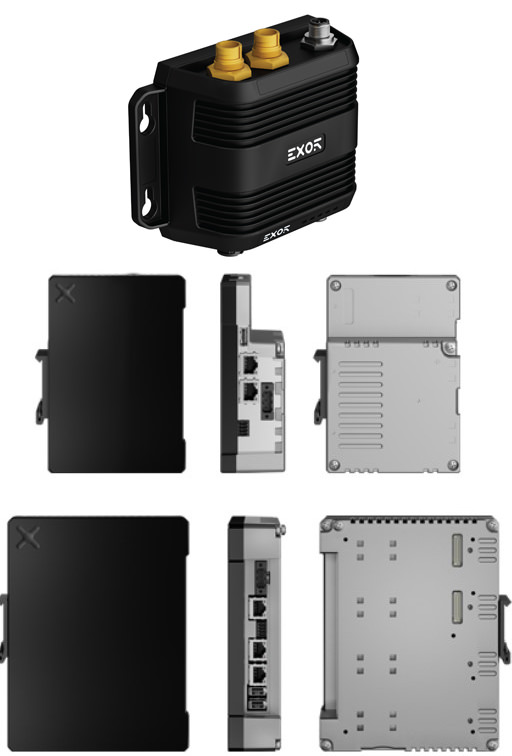The Ultimate Guide to Edge Computing
What is Edge Computing?
Edge computing can be defined as the deployment of data-handling activities and operations at the source without having to go through centralized network segments. This computing process optimizes equipment, IIoT devices, and applications by bringing computing closer to the network edge of these items that produce data. Depending on the device or equipment being considered, the network edge can refer to the area where the device communicates with the internet.
For IIoT devices, such as a smart camera, the network edge will be the processor within the camera, while for non-connected equipment, the network edge will be within the smart edge device attached to the equipment. And what are smart edge devices? This refers to devices equipped with features for capturing data and processing it such as the exWare IIoT Gateway. Smart edge devices bring edge computing to legacy machinery within industrial shop floors.

The Role of Edge Computing Devices
Edge computing devices are the hardware that drives the application of edge computing across diverse industries. They are used to accomplish different tasks depending on the software applications or features they’re provisioned with.
In the manufacturing industry, edge devices play the important role of bringing low latency processing to the shop floor. This makes it feasible to optimize production through data-driven policies. An example is the use of edge computing to collect machine data from legacy equipment. In this case, edge devices are attached to the equipment and captured data can be transferred and used for overall equipment efficiency (OEE) calculations.
OEE calculations enable the ability to integrate a data driven plant performance optimization business model within brownfield facilities. The accuracy edge computing devices bring to collecting data ensures the OEE calculation is more accurate than when manual data collection processes are used.
Edge computing also simplifies data analytics within manufacturing shop floors. In instances where a shop floor contains hundreds of machines and IIoT devices, edge devices collect, process, and store data through a decentralized system. This ensures processing occurs in real-time without having to always access the cloud or external data centers.
The decentralized nature of edge computing also means security is local to each edge device. Thus, this serves as a shield against cyberattacks. In situations where successful breaches occur, the information located within the breached edge network is affected but not transferred to other networks within an enterprise’s ecosystem.
Manufacturers within the biomedical industry and service providers who own warehouses can also leverage edge computing devices to enhance shop floor operations. Attaching edge devices to material handling tools or within specific sections helps with understanding shop floor traffic, inventory management, and productivity. The captured data can then be used to simplify warehousing and speed up order processing activities.

EXOR exWare IIoT Edge Gateways
For IT and OT managers striving for seamless data flow in complex environments, EXOR’s IIoT Edge Gateways integrate devices with advanced web technologies, ensuring unparalleled connectivity, security, and efficiency. Their gateways bridge the gap between devices and systems, streamlining operations for the future-ready industry.
Key Features

JMobile data gateway functions including OPC UA server/client, MQTT publisher. Communication protocols available for connection to field devices.

Plug and forget integration into existing infrastructure. Device data flow easily configured.

Excellent worldwide tech support provided.
Key Differentiators

Protocol Versatility – EXOR IIoT Gateways are designed for multi-protocol support, ensuring smooth interoperability among diverse devices and systems.

Enhanced Security Protocols – With cybersecurity at its core, EXOR gateways come equipped with advanced security features, safeguarding data and ensuring unauthorized access prevention.

Edge Computing Capabilities – Their gateways are not mere data passers. With edge computing functionalities, they can process and analyze data on-site, enabling faster decision-making.

Remote Management & Diagnostics – Leveraging the power of the Corvina, EXOR gateways allow for remote monitoring, diagnostics, and management, ensuring that system health is always at its optimal.

Intuitive Integration with JMobile Software – EXOR’s renowned JMobile software ensures that the gateway’s integration is user-friendly, allowing for rapid project deployment and a seamless user experience.
The future of Industry 4.0 and cloud computing will be shaped by the use of distributed and decentralized computing solutions. Edge computing provides the decentralization and resilience needed to shape that future.
For organizations, this means real-time decisions, bolstered security, and enhanced operational efficiency. In a world moving towards comprehensive digitization, the incorporation of dependable gateways like those from EXOR becomes essential.
iOpen, as a supplier of automation and communication solutions, can provide access to this innovative product from EXOR International, with unmatched durability, connectivity, and flexibility.
If you’re interested in learning more about the exWare IIoT Edge Gateway, please fill out our online contact form and we’ll be in touch as soon as possible.
